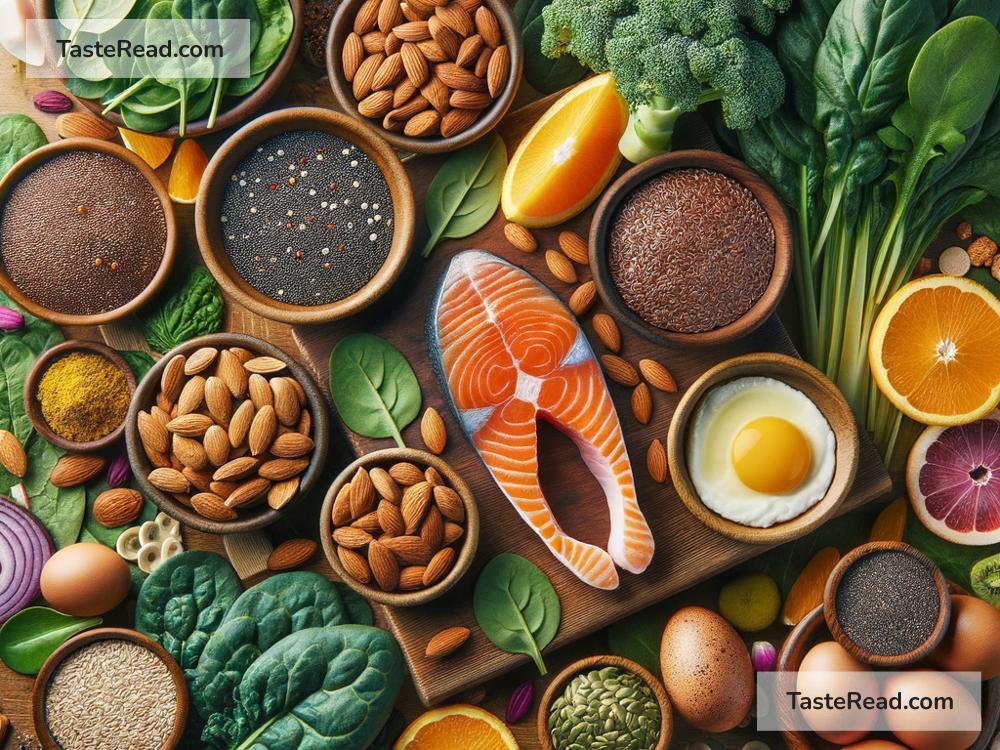Foods That Reduce the Risk of Osteopenia
Osteopenia is a condition where your bones become weaker than normal. It’s not as severe as osteoporosis, but it still means your bones are losing density, which makes them more prone to fractures. The good news is that you can help keep your bones strong and healthy by eating the right foods. Certain nutrients, like calcium, vitamin D, and magnesium, are key to maintaining strong bones. Here are some foods that can reduce the risk of osteopenia and improve your overall bone health.
1. Dairy Products: Rich in Calcium
Calcium is one of the most important nutrients for bone health, and dairy products are some of the best sources of it. Foods like milk, cheese, and yogurt are packed with calcium, which strengthens your bones and helps prevent bone loss.
If you’re lactose intolerant or don’t consume dairy, there are plenty of other calcium-rich options available, such as fortified plant-based milks like almond milk or soy milk. Look for ones that have added calcium and vitamin D for an extra boost to your bones.
2. Leafy Green Vegetables
Leafy greens like kale, spinach, broccoli, and collard greens are excellent sources of calcium as well as other nutrients like magnesium and vitamin K. Vitamin K helps regulate calcium in your body and promotes bone mineralization, ensuring that calcium gets stored in your bones.
Adding leafy greens to your meals is easy. You can toss spinach into a salad, blend kale into a smoothie, or roast broccoli as a side dish. These veggies are not only good for your bones but also loaded with antioxidants that benefit your whole body.
3. Fatty Fish for Vitamin D
Vitamin D plays a critical role in bone health because it helps your body absorb calcium. Fatty fish like salmon, tuna, and mackerel are great sources of vitamin D. Eating these fish a few times a week can help you maintain healthy bones while providing heart-healthy omega-3 fatty acids.
If you’re not a fan of fish, you can opt for foods fortified with vitamin D, like certain cereals or orange juice. Spending some time in sunlight can also help your body produce vitamin D naturally, but always protect your skin from too much sun exposure.
4. Nuts and Seeds: Magnesium Boost
Magnesium is another key nutrient for keeping bones strong, as it works together with calcium to maintain bone density. Nuts and seeds like almonds, sunflower seeds, pumpkin seeds, and chia seeds are great sources of magnesium. They also contain healthy fats and other vitamins that support overall health.
You can snack on a handful of nuts, sprinkle seeds into your yogurt or smoothies, or use almond butter as a spread. These easy additions to your diet can make a big difference in protecting your bones.
5. Beans and Lentils
Legumes like beans, lentils, and chickpeas are loaded with nutrients that benefit your bones, including calcium, magnesium, and phosphorus. Phosphorus is vital for the development of strong bones and teeth. Beans are also high in protein, another important factor for maintaining muscle mass that supports your bones.
You can add beans and lentils to soups, salads, or grain bowls for a nutritional powerhouse. Plus, they’re an affordable way to include bone-friendly nutrients in your diet.
6. Eggs
Eggs are a good source of vitamin D and protein, both of which are valuable for bone health. Having an egg or two in your daily meals can help supplement your vitamin D intake, particularly if fortified foods or sunlight aren’t available.
Whether scrambled, boiled, or added to a breakfast sandwich, eggs are a versatile and tasty way to support strong bones.
7. Fortified Foods
Many foods today are fortified with calcium and vitamin D to help people get enough of these essential nutrients. Fortified foods include cereal, bread, plant-based milk, and even some types of tofu. These are particularly beneficial if you have dietary restrictions or follow a plant-based diet.
When shopping, check the label to ensure that the food you’re buying is fortified. Incorporating these foods into your meals provides a convenient way to improve your bone health.
8. Fruits High in Vitamin C
Vitamin C helps produce collagen, a key component that gives bones their strength and flexibility. Fruits like oranges, strawberries, papaya, and kiwi are high in vitamin C, making them great additions to a bone-strengthening diet.
Enjoy these fruits as snacks, in a fruit salad, or blended into smoothies. They also boost your immune system, which is an added bonus.
9. Whole Grains
Whole grains like oats, quinoa, and brown rice contain magnesium and phosphorus, which are essential for bone health. While they don’t have as much calcium as dairy or leafy greens, whole grains provide a balanced source of nutrients that help maintain healthy bones.
Swap refined grains for whole grains in your meals to get more fiber and bone-supporting nutrients.
Conclusion
Preventing osteopenia starts with understanding the role of nutrition in maintaining healthy bones. Including calcium-rich foods like dairy and leafy greens, vitamin D sources like fatty fish and eggs, and magnesium-packed options like nuts and seeds can make a big difference.
Remember, a balanced diet paired with regular exercise, like weight-bearing activities, is the best way to keep your bones strong. By making smart diet choices today, you can protect your bone health and reduce the risk of osteopenia for years to come.
Give your bones the nutrients they need, and they’ll support you for a lifetime.


